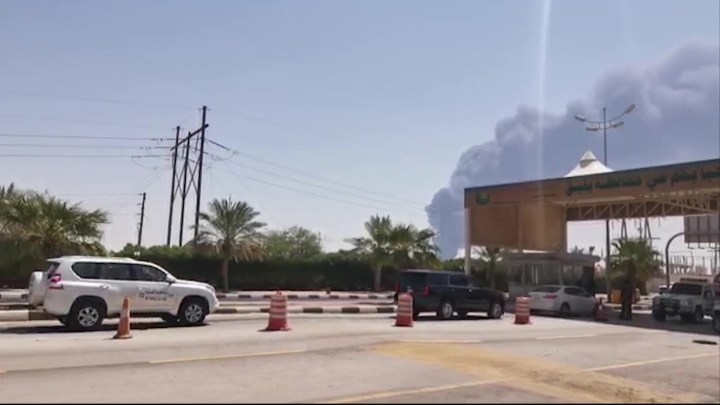
How the energy market affects the price at the pump

The price of oil plunged Tuesday, following a spike in prices after an attack Saturday on Saudi Arabia’s most profitable oil facilities. The price of gasoline is still expected to rise, affecting consumers and industries like transportation. So as the oil market fluctuates, we wanted to talk to someone who knows a little about what to do when that happens.
Amelie Carlton, who teaches economics at Rice University in Houston and formerly traded energy commodities, remembers the panic that came from working in the business. She spoke to “Marketplace” host Kai Ryssdal. The following is an edited transcript of their conversation.
Kai Ryssdal: So we’re going to get to the economics of all this in a minute but one of the reasons we got you on the phone in particular is that before you went the economics Ph.D. route, you used to trade energy, right?
Amelie Carlton: Yes, I traded energy commodities for Williams energy companies in Tulsa, Oklahoma.
Ryssdal: OK, so when something like the oil shock that we got a day and a half ago happens, what’s life like in the energy trading community?
Carlton: There is a lot of uncertainty in the market when there is a supply shock, particularly from geopolitical risk abroad. And that uncertainty causes panic in the markets.
Ryssdal: So panic is a strong word. Do you get a call at 3:30 in the morning and you have to go in and start working things?
Carlton: Absolutely. Traders are always paying attention to the production of oil and natural gas because the market and the equilibrium supply and demand, or tight reduction in supply, can lead to huge response and price fluctuation, in particular pricing increases.
Ryssdal: This is gonna sound really cynical, but I gotta ask it anyway: When something like this happens, is the mindset, “We can make a lot of money doing this” or “Oh, hang on for the ride”?
Carlton: I think it depends from your perspective. If you’re a producer, you can gain from an increase in price. If you’re a consumer, the increase in cost through whether it be gasoline prices or small business owners inputs into production, energy costs are higher. There’s a cost to those small businesses and consumer side, but on the producer side, they benefit.
Ryssdal: So let’s talk about those consumers for a second and roll your economics Ph.D. in here for a minute along with your experience. Oil prices have gone down a little bit today, but they’re still up from where they were at the end of last week. Consumers, I’m sure, are bracing for it to show up at the pumps. How long until we start paying more for gas?
Carlton: Well, you can see that RBOB, or the gasoline price, moves —
Ryssdal: RBOB is the trading symbol for gas, right, that you guys use?
Carlton: Yes. Where RBOB futures basically mirrored the move in crude, the price at the pump should increase accordingly. You know, the oil prices matter for the economy in several ways. Changes in oil prices directly affect transportation costs, the price at the pump, heating bills, prices of goods made with petroleum products. All of these things will reflect an increase in the inputs, such as the price of a barrel of oil.
Ryssdal: Right, right. So, we had Scott Tong on the program yesterday, and he did a news spot for us, the thesis of which basically was, “Look, there’s plenty of supply out there to meet demand. What we’re encountering now is this risk premium of unknown violence, really, in the oil sector.” Do you buy that?
Carlton: I do. I think there will be a risk premium associated now. And, you know, the supply from Saudi Arabia is roughly around 5% of global supply. And I think that the risk premium will be priced in. Because of the uncertainty, people will be more cautious, and there will be higher prices for a barrel of oil as a result.
Ryssdal: Right. OK, so here’s kind of a mood question, right? You’re in Houston, lots of refineries, lots of oil. Obviously that’s the center of the American petroleum industry. Given what happened in Saudi Arabia over the weekend, what’s the mood in Houston?
Carlton: People in Texas are much more worried about low oil prices causing job cuts then they are about high prices causing recession.
There’s a lot happening in the world. Through it all, Marketplace is here for you.
You rely on Marketplace to break down the world’s events and tell you how it affects you in a fact-based, approachable way. We rely on your financial support to keep making that possible.
Your donation today powers the independent journalism that you rely on. For just $5/month, you can help sustain Marketplace so we can keep reporting on the things that matter to you.


















